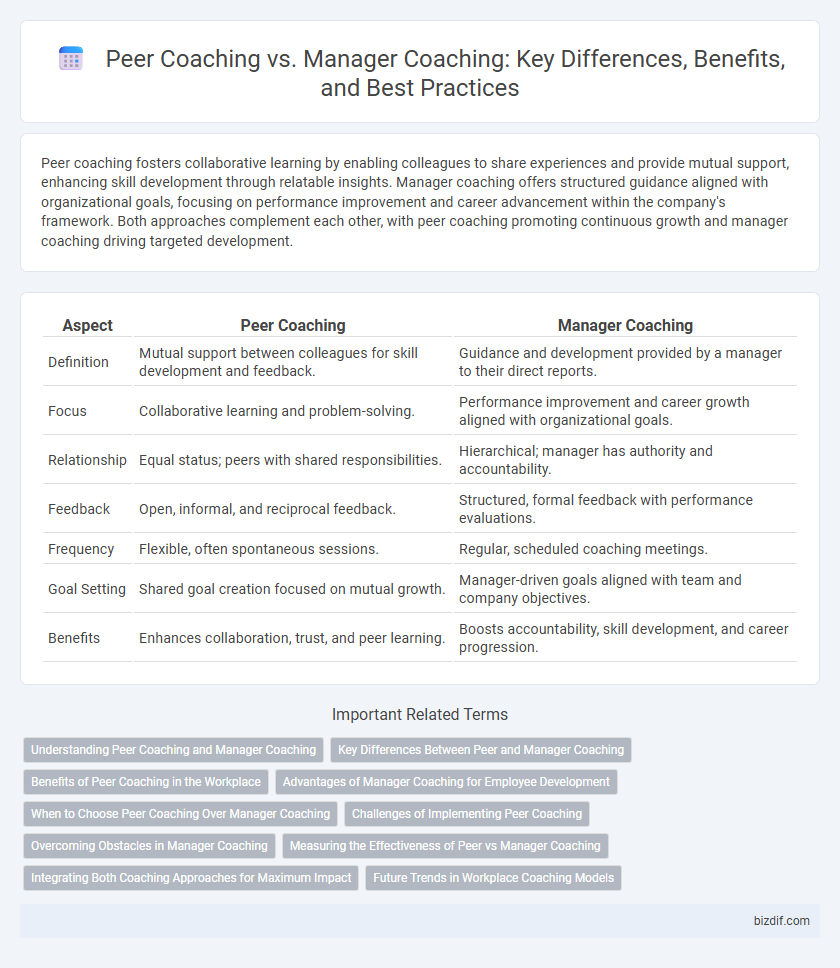Peer coaching fosters collaborative learning by enabling colleagues to share experiences and provide mutual support, enhancing skill development through relatable insights. Manager coaching offers structured guidance aligned with organizational goals, focusing on performance improvement and career advancement within the company's framework. Both approaches complement each other, with peer coaching promoting continuous growth and manager coaching driving targeted development.
Table of Comparison
| Aspect | Peer Coaching | Manager Coaching |
|---|---|---|
| Definition | Mutual support between colleagues for skill development and feedback. | Guidance and development provided by a manager to their direct reports. |
| Focus | Collaborative learning and problem-solving. | Performance improvement and career growth aligned with organizational goals. |
| Relationship | Equal status; peers with shared responsibilities. | Hierarchical; manager has authority and accountability. |
| Feedback | Open, informal, and reciprocal feedback. | Structured, formal feedback with performance evaluations. |
| Frequency | Flexible, often spontaneous sessions. | Regular, scheduled coaching meetings. |
| Goal Setting | Shared goal creation focused on mutual growth. | Manager-driven goals aligned with team and company objectives. |
| Benefits | Enhances collaboration, trust, and peer learning. | Boosts accountability, skill development, and career progression. |
Understanding Peer Coaching and Manager Coaching
Peer coaching fosters collaborative learning by encouraging colleagues at similar levels to share feedback, insights, and support, which enhances skill development in a non-hierarchical environment. Manager coaching involves supervisors guiding employees through goal setting, performance improvement, and career growth, leveraging their authority and organizational knowledge. Both approaches deliver unique benefits: peer coaching promotes trust and mutual growth, while manager coaching ensures alignment with organizational objectives and accountability.
Key Differences Between Peer and Manager Coaching
Peer coaching emphasizes collaborative learning and mutual support among colleagues at similar levels, fostering open communication and shared problem-solving. Manager coaching involves a hierarchical dynamic where managers provide guidance, performance feedback, and strategic direction to support employee development aligned with organizational goals. The key differences lie in the source of authority, focus areas, and the balance between personal growth versus performance management.
Benefits of Peer Coaching in the Workplace
Peer coaching in the workplace fosters a collaborative environment that enhances skill development through mutual feedback and shared experiences, leading to increased employee engagement and trust. It encourages continuous learning by enabling peers to address real-time challenges and provide practical solutions, which boosts problem-solving capabilities. Organizations benefit from peer coaching by cultivating a supportive culture that drives innovation and improves team performance without the hierarchical constraints typical of manager coaching.
Advantages of Manager Coaching for Employee Development
Manager coaching directly aligns employee development with organizational goals, ensuring personalized guidance tailored to specific job roles and performance expectations. It fosters accountability and provides timely, actionable feedback, enhancing skill acquisition and behavioral improvements. This targeted support helps accelerate career growth and strengthens team cohesion through structured development pathways.
When to Choose Peer Coaching Over Manager Coaching
Peer coaching is ideal when seeking collaborative problem-solving and diverse perspectives within a similar role or experience level, fostering mutual growth and trust. It is effective for skill development in specific tasks where peers share practical insights and provide real-time feedback without hierarchical pressure. Choose peer coaching when enhancing team cohesion and encouraging open, honest communication that may be less formal than manager-led guidance.
Challenges of Implementing Peer Coaching
Implementing peer coaching faces challenges such as uneven skill levels among participants, which can hinder effective knowledge sharing and create imbalanced coaching relationships. Lack of clear structure and defined roles often leads to inconsistent feedback and difficulty maintaining accountability. Overcoming these obstacles requires strategic training, ongoing support, and a culture that values collaborative learning.
Overcoming Obstacles in Manager Coaching
Manager coaching often encounters obstacles such as power dynamics, limited trust, and time constraints, which can hinder open communication and effective feedback. Unlike peer coaching, where mutual support and shared experiences foster a collaborative environment, managers must actively cultivate psychological safety and allocate time to understand individual employee challenges. Addressing these barriers through tailored communication strategies and consistent follow-up improves engagement, builds trust, and enhances coaching outcomes.
Measuring the Effectiveness of Peer vs Manager Coaching
Measuring the effectiveness of peer coaching involves tracking collaborative learning outcomes, increased knowledge sharing, and enhanced team dynamics, often assessed through feedback surveys and performance metrics. Manager coaching effectiveness is typically evaluated by improvements in employee goal attainment, skill development, and overall productivity, using regular performance reviews and individual progress tracking. Data-driven insights from these measurements help organizations tailor coaching strategies to maximize employee growth and organizational performance.
Integrating Both Coaching Approaches for Maximum Impact
Integrating peer coaching and manager coaching enhances organizational development by combining diverse perspectives with authoritative guidance to foster comprehensive employee growth. Peer coaching encourages collaborative learning and skill-sharing among colleagues, while manager coaching provides strategic alignment and performance accountability. Leveraging both approaches creates a balanced coaching ecosystem that drives engagement, skill mastery, and business outcomes simultaneously.
Future Trends in Workplace Coaching Models
Peer coaching is gaining traction as organizations emphasize collaborative learning and employee empowerment, fostering a culture of continuous feedback and shared accountability. Manager coaching remains essential for aligning individual goals with organizational objectives, but future workplace coaching models are expected to integrate AI-driven insights to personalize coaching experiences. Hybrid approaches combining peer and manager coaching with digital platforms will shape the evolving landscape of workplace development.
Peer coaching vs manager coaching Infographic

 bizdif.com
bizdif.com